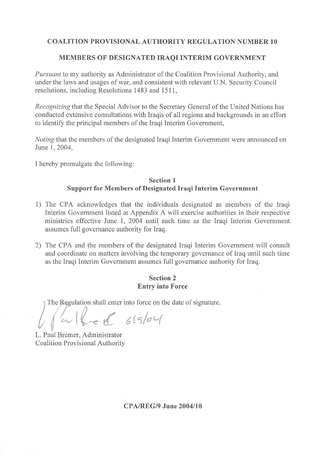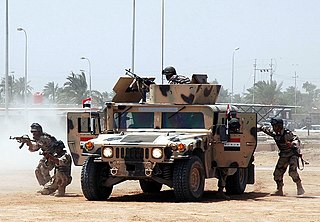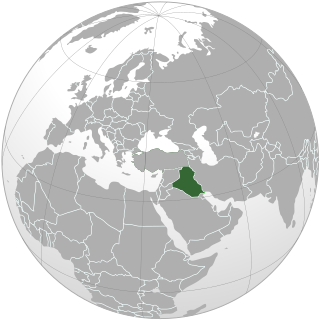
United Nations Security Council resolution 1546, adopted unanimously on 8 June 2004, after reaffirming previous resolutions on Iraq, the Council endorsed the formation of the Iraqi Interim Government, welcomed the end of the occupation and determined the status of the multinational force and its relationship with the Iraqi government.

United Nations Security Council Resolution 1700, adopted unanimously on August 10, 2006, after recalling previous resolutions on Iraq, particularly resolutions 1500 (2003), 1546 (2004), 1557 (2004) and 1619 (2005), the Council extended the mandate of the United Nations Assistance Mission in Iraq (UNAMI) for a further period of twelve months until August 10, 2007.

United Nations Security Council Resolution 1723, adopted unanimously on November 28, 2006, after recalling previous resolutions on Iraq, the Council extended the mandate of the multinational force until the end of 2007.

The United Nations Assistance Mission for Iraq (UNAMI) was formed on 14 August 2003 by United Nations Security Council (UNSC) Resolution 1500 at the request of the Iraqi government to support national development efforts.

United Nations Security Council resolution 1401, adopted unanimously on 28 March 2002, after recalling all previous resolutions on the situation in Afghanistan, including resolutions 1378 (2001), 1383 (2001) and 1386 (2001), the Council endorsed the establishment of the United Nations Assistance Mission in Afghanistan (UNAMA). It would replace the longstanding United Nations Special Mission to Afghanistan.

United Nations Security Council Resolution 1936, adopted unanimously on August 5, 2010, after recalling all previous resolutions on the situation in Iraq, including resolutions 1500 (2003), 1546 (2004), 1557 (2004), 1619 (2005), 1700 (2006), 1770 (2007), 1830 (2008) and 1883 (2009), the Council extended the mandate of the United Nations Assistance Mission in Iraq (UNAMI) for a further period of 12 months, until July 31, 2011.

United Nations Security Council resolution 1471, adopted unanimously on 28 March 2003, after reaffirming all resolutions on the situation in Afghanistan, the Council extended the mandate of the United Nations Assistance Mission in Afghanistan (UNAMA) for an additional period of twelve months until 28 March 2004.

United Nations Security Council resolution 1500, adopted on 14 August 2003, after reaffirming previous resolutions on Iraq, particularly Resolution 1483 (2003), the council established the United Nations Assistance Mission in Iraq (UNAMI) and welcomed the creation of the Iraqi Governing Council.

United Nations Security Council resolution 1536, adopted unanimously on 26 March 2004, after reaffirming all resolutions on the situation in Afghanistan, particularly Resolution 1471 (2003), the council extended the mandate of the United Nations Assistance Mission in Afghanistan (UNAMA) for an additional period of twelve months until 26 March 2005.

United Nations Security Council resolution 1589, adopted unanimously on 24 March 2005, after reaffirming all resolutions on the situation in Afghanistan, particularly Resolution 1536 (2004), the council extended the mandate of the United Nations Assistance Mission in Afghanistan (UNAMA) for an additional period of twelve months until 24 March 2006.

United Nations Security Council Resolution 1590, adopted unanimously on 24 March 2005, after recalling resolutions 1547 (2004), 1556 (2004), 1564 (2004), 1574 (2004), 1585 (2005) and 1588 (2005) on the situation in Sudan, the Council established the United Nations Mission in Sudan (UNMIS) for an initial period of six months.

United Nations Security Council resolution 1619, adopted unanimously on 11 August 2005, after reaffirming previous resolutions on Iraq, particularly resolutions 1500 (2003), 1546 (2004) and 1557 (2004), the Council extended the mandate of the United Nations Assistance Mission in Iraq (UNAMI) for a further period of twelve months.

United Nations Security Council resolution 1639, adopted unanimously on 21 November 2005, after recalling previous resolutions on the conflicts in the former Yugoslavia, including resolutions 1031 (1995), 1088 (1996), 1423 (2002), 1491 (2003), 1551 (2004) and 1575 (2004), the Council extended the mandate of EUFOR Althea in Bosnia and Herzegovina as a legal successor to the Stabilisation Force (SFOR) for a further twelve months.

United Nations Security Council Resolution 1667, adopted unanimously on March 31, 2006, after recalling all previous resolutions on the situations in Liberia and the subregion, particularly resolutions 1626 (2005) and 1638 (2005), the Council extended the mandate of the United Nations Mission in Liberia (UNMIL) until September 30, 2006.

United Nations Security Council Resolution 1670, adopted unanimously on April 13, 2006, after reaffirming all resolutions on the situation between Eritrea and Ethiopia, particularly resolutions 1640 (2005) and 1661 (2006), the Council extended the mandate of the United Nations Mission in Ethiopia and Eritrea (UNMEE) for a period of one month until May 15, 2006.

United Nations Security Council Resolution 2001, adopted unanimously on July 28, 2011, after recalling all previous resolutions on the situation in Iraq, including resolutions 1500 (2003), 1546 (2004), 1557 (2004), 1619 (2005), 1700 (2006), 1770 (2007), 1830 (2008), 1883 (2009) and 1936 (2010), the Council extended the mandate of the United Nations Assistance Mission in Iraq (UNAMI) for a further period of 1 year.

The United Nations Support Mission in Libya (UNSMIL) is a United Nations (UN) advanced mission in Libya, created in the aftermath of the Libyan Civil War. UNSMIL is a political mission, not a military mission. The main elements of its mandate defined by the UN include supporting Libyan transitional authorities in "post-conflict efforts", providing mediation in implementing Libyan political agreements, supporting key Libyan institutions and monitoring and reporting on human rights. UNSMIL is led by the UN Department of Political Affairs.

United Nations Security Council Resolution 1830 was unanimously adopted on 7 August 2008.

United Nations Security Council Resolution 1883 was unanimously adopted on 7 August 2009.

United Nations Security Council Resolution 2110 is a United Nations Security Council resolution adopted unanimously by the United Nations Security Council on 24 July 2013, extending the United Nations Assistance Mission for Iraq until 31 July 2014 as stipulated in several previous resolutions The resolution signaled its intention to review the original mandate, as stipulated in UNSC resolution 2061 within twelve months.


















